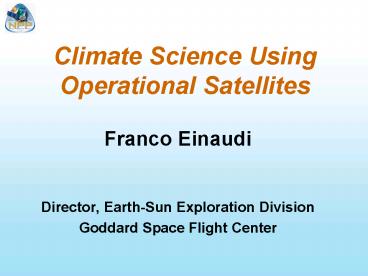Climate Science Using Operational Satellites - PowerPoint PPT Presentation
1 / 19
Title:
Climate Science Using Operational Satellites
Description:
Show Improvements to Forecast. Implement new measurements on 'operational' ... profile data set since 1970, surface UVB and aerosol absorption data since 1978. ... – PowerPoint PPT presentation
Number of Views:33
Avg rating:3.0/5.0
Title: Climate Science Using Operational Satellites
1
Climate Science Using Operational Satellites
- Franco Einaudi
- Director, Earth-Sun Exploration Division
- Goddard Space Flight Center
2
Research to Operations
Research Instruments to Operational Instruments
Research
- Traditional
- Ad-Hoc Operational Data Set Improvement
- Limited by operational algorithms and instrument
calibration - Examples, MSU temperature, Total Ozone, NDVI
- Traditional
- Demonstrate New Measurements
- Show Improvements to Forecast
- Implement new measurements on operational
platforms - Send new data to NWP centers
Operations
3
Research to Operations to Research
Research Instruments to Operational
Instruments Operational Data to Research Data
Research
- Traditional
- Ad-Hoc Operational Data Set Improvement
- Limited by operational algorithms and instrument
calibration - Future
- NPOESS Paradigm
- Build research features into operational
instruments - Strong IORD Requirements
- Detailed Implementation Strategy being Developed
- Traditional
- Demonstrate New Measurements
- Show Improvements to Forecast
- Implement new measurements on operational
platforms - Send new data to NWP centers
Operations
4
Time Series Reveal Global Change Trends
- Is Earth surface air temperature changing?
- How is global ocean circulation varying on
interannual, decadal, and longer time scales?
- Is vegetation growth reacting to climate
change? - How are the atmospheres composition and
dynamics changing?
Atmospheric Sounding
Multispectral Imaging
Multispectral Imaging
Ozone Sounding
5
NPP/NPOESS Continues Data Record
Year
Measurement System
Conventional Operations EOS Technology Jump
Research Quality Operations
6
(No Transcript)
7
(No Transcript)
8
(No Transcript)
9
NASAs NPP Science Role
- Climate data record (CDR) a time series of
measurements of sufficient length, consistency,
and continuity to determine climate variability
and change. (National Research Council Climate
Data Records from Environmental Satellites, 2004) - The NPP Science Charter is to Continue the
scientific data record started in the EOS era. - NASA is moving toward Measurement-based, not
Mission-based, science and data processing
teams. - Integrated EOS/NPP/NPOESS Satellite data records
will be produced. - GSFC will produce several of these data sets.
- GSFC provides end-to-end data service
- Algorithm Development Instrument performance
characterization to - Data production data distribution to end users
10
GSFC Data Sets
11
GSFC Data Sets
12
Ozone Layer Questions
OMI Ozone 10/1/2005
- Questions
- Is the Ozone Layer recovering after the Montreal
Protocol? - 2) Is climate change affecting the speed of
recovery?
Data 1) Need Total Ozone Column Data Set NASA
TOMS,OMI and NOAASBUV2 to NPOESS OMPS 2) Need
Lower Stratosphere Ozone Data Set NASA SAGEI/II,
HALOE, MLS to NPOESS OMPS
13
NASA/NOAA Satellite Total Ozone
14
Satellite vs Ground-based Total Ozone
15
Satellite and 3D CTM Model Results
50 yr model run with the global ozone data
16
Carbon Cycle Questions
SeaWiFS July 2003
Where are the carbon sources and sinks? Are
sources/sinks changing? Is the biosphere
changing? Data Sources AVHRR, MODIS, LandSat
17
Multi satellite NDVI time series
NDVI data set and the satellites that are used.
18
Growing and Temperature
19
Conclusion
We are facing important climate questions that
require quality data. Operational satellite
systems have and will provide the required
data. The partnerships, i.e. GEOSS, are
required Expand on the experience that we
already have to produce additional climate data
sets.































